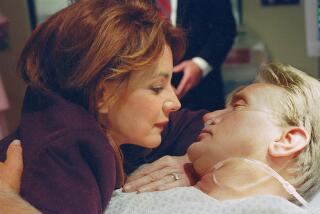A Real-Life Drama : His Speedy Rescue of a Man Shot and Left Bleeding in the Street Earns an Actor Credit for Saving a Life
- Share via
A year ago, Grand Bush, an actor frequently seen in film and on television, came to the aid of accountant Robert Nimmons after he was critically wounded in a racially motivated shooting. For saving Nimmons’ life by rushing him to the Cedars-Sinai Medical Center emergency room, Bush will be honored with the district attorney office’s Courageous Citizen’s Award on April 22.
*
He’s returned the fire of desperate criminals and been showered with police bullets--it’s all in a day’s work for a film and TV actor.
Grand Bush has seen action in countless character roles, such as the detective Little Johnson in “Die Hard.”
But no screen role could have prepared him for the drama that unfolded on the upscale residential streets of Los Angeles’ Cathay Cirle.
On a sunny St. Patrick’s Day last year, Robert Nimmons took a lnch-hour stroll from Wilshire south toward Cathay Circle Park. He could not have known that Darryl Arnold was stalking him. Arnold would later tell police we hoped to start a race war by shooting a white person.
Bush was returning from an interview, accompanied by his friend, Terri Ross. He drove Ross’ car south on Crescent Heights Boulevard. He could not have known that just past the Wilshire commercial stretch, he would see Nimmons, seconds after he had been shot.
“(Arnold) shot me from behind. I turned around and saw him--eight, 10 feet away, still pointing this gun, a smile on his face,” Nimmons recalls. “I staggered across the street, onto the median. I was bleeding. Cars continued past until Grand Bush came.”
Bush caught sight of Arnold walking away, gun still at his side. Bush wheeled the car around and pulled to the median. “Get in, man!”
“I just piled into the back of his car,” Nimmons recalls.
Bush worried that the gunman might turn to see the rescue, and “I didn’t know if he would fire on us.”
As the trio headed for 3rd Street, Bush asked, “Are you all right?”
When Nimmons responded with a weak, “I guess so,” Bush pulled out, dodging oncoming traffic and red lights on the way to the emergency room.
Bush followed Nimmons inside and watched. “They were tearing his clothes off. I waited to see that he was all right and, a few days later, Terri and I visited him in the hospital.” Nimmons would never had made it without the speedy rescue, a doctor said later.
Nimmons, a distinguished, gray-at-the-temples father of two, would come to consider Bush, a solidly built bachelor with an easy smile, a friend.
Both men had put the incident behind them until this January, when Arnold pleaded no contest to attempted murder and a civil-rights charge of committing a hate crime, and sentenced to 20 years in prison. But in Arnold’s rambling confession and statement, the two saw signs of hope. Arnold wrote, “I realized I care a great deal about every race of people.”
Bush recalls Nimmons saying: “I’d like to see this guy rehabilitated. The justice system doesn’t make rehabilitation a priority.”
Bush has felt that way since the late 1980s, when he worked as a counselor at a juvenile offenders camp.
“The kids were so hungry for something to inspire them. I wondered: What’ll they do when they get out--couldn’t they take a car thief and teach him auto repair?”
Determined to do his part, Bush invited fellow actors to perform for the youngsters. But the offer of a recurring role on TV’s “The Young and the Restless” pushed his counseling work into the background.
Months later, a teen-ager approached him at a film audition.
“I remember you actors at the camp,” he recalls her saying. “When I got out, I told my mom I wanted to be an actor.” The teen-ager, auditioning for a role, told him that he had been the key to her rehabilitation.
“I got goose bumps,” Bush recalls.
Since the camp experience, “I’ve addressed assemblies at a dozen Los Angeles schools,” Bush says. “I don’t talk about the shooting incident; my platform is fine arts and education. If one wants to become an actor, one must have an education.”
Talking about the benefits of education wasn’t enough for Bush, though.
“Just before the shooting incident, (screenwriter) Shane Salerno and I had begun writing a script critical of the lack of criminal rehabilitation, ‘The Darkness and the Light.’
“Oddly, I was researching the criminal justice system when I got caught in the middle of that shooting incident and met Bob.”
Deputy District Atty. Rhonda Saunders nominated Bush and Ross for the county’s Courageous Citizen’s Award, given to those who thwart a crime, stop a criminal or aid a victim.
What about all those other passersby who didn’t stop to help?
“I don’t resent the people driving by,” Nimmons says. “One emerged from the pack, a good Samaritan. A black man shot me; a black man rescued me.”
Bush concludes: “I never considered myself a hero, but if no one else does something, I will . In this case, no one else (did).”
*
This column tells the stories of the unsung heroes of Southern California, people of all ages and vocations and avocations, whose dedication as volunteers or on the job makes life better for the people they encounter. The column is published every other Monday.
More to Read
Only good movies
Get the Indie Focus newsletter, Mark Olsen's weekly guide to the world of cinema.
You may occasionally receive promotional content from the Los Angeles Times.







